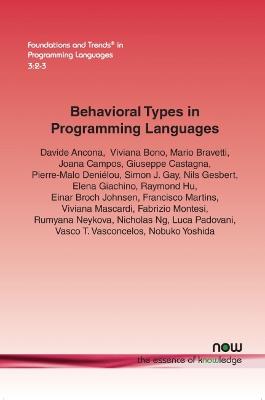Foundations and Trends (R) in Programming Languages
1 total work
Behavioral Types in Programming Languages
by Davide Ancona, Viviana Bono, Mario Bravetti, Joana Campos, Giuseppe Castagna, Pierre-Malo Denielou, Simon J. Gay, Nils Gesbert, Elena Giachino, and Raymond Hu
Published 21 July 2016
A recent trend in programming language research is to use behavioral type theory to ensure various correctness properties of large-scale, communication-intensive systems. Behavioral types encompass concepts such as interfaces, communication protocols, contracts, and choreography. The successful application of behavioral types requires a solid understanding of several practical aspects, from their representation in a concrete programming language, to their integration with other programming constructs such as methods and functions, to design and monitoring methodologies that take behaviors into account.
Behavioral Types in Programming Languages provides the reader with the first comprehensive overview of the state of the art of these practical aspects, which are summarized as the pragmatics of behavioral types. Each section covers a particular programming paradigm or methodology, providing an ideal reference for programming languages researchers interested the topic, and in identifying the areas as yet unexplored.
Behavioral Types in Programming Languages provides the reader with the first comprehensive overview of the state of the art of these practical aspects, which are summarized as the pragmatics of behavioral types. Each section covers a particular programming paradigm or methodology, providing an ideal reference for programming languages researchers interested the topic, and in identifying the areas as yet unexplored.
